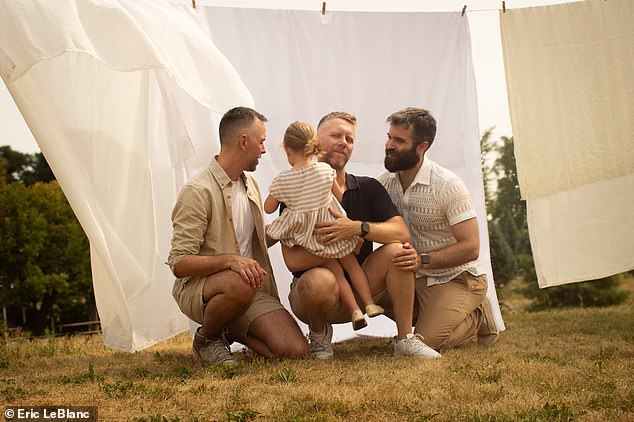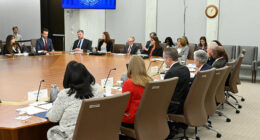A gay ‘throuple’ who adopted a little girl have launched a lawsuit demanding that their home state of Quebec legally recognizes all three of them as her parents.
Eric LeBlanc, Jonathan Bédard, and Justin Maheu, said they had been trying to become fathers for years until they were finally matched with a child this week.
The trio, who live together in Montreal as a ‘throuple’, said they adopted the three-year-old girl through the Quebec Youth Protection Services (DPJ) on Thursday.
‘She’s perfect,’ LeBlanc told CTV News. ‘She’s curious, she’s energetic. She loves to play, she loves to jump, she loves to dance.’
However, it followed a long process involving two years of fostering, and after hiring a lawyer to convince adoption services they were a good fit.
The trio said their main roadblock were Quebec’s laws, which do not recognize more than two people as parents.
At the moment, the state’s political and judiciary officials are at loggerheads over the issue, with one liberal Superior Court Judge saying the status quo is ‘unconstitutional’ – while the state attempts to block any changes.
Canada is generally ruled by very liberal laws, and several states including Ontario and British Columbia do legally recognize more than two parents.

A gay ‘throuple’ who have adopted a three-year-old girl have launched a lawsuit demanding that their home state of Quebec legally recognizes them as parents

Eric LeBlanc, Jonathan Bédard, and Justin Maheu, (pictured together) said they had been trying to become fathers for years until they were finally matched with a child this week
LeBlanc, Bédard and Maheu said the first adoption agency they approached would not take them on because of Quebec’s legal system.
After hiring a lawyer, they convinced another agency to take on their case, who began evaluating them more than two years ago.
‘Through that process they learned that we are a little different because we’re three, but we’re not different from any other family,’ LeBlanc told CTV News.
LeBlanc, Bédard and Maheu are now pushing for the right for all three of them to be recognized as parents in Quebec.
In April last year, a Superior Court Judge in the state ruled that the government has one year to modify the civil code which would allow children to have more than two legal parents.
The judge said the status quo is ‘unconstitutional’ and violates the Canadian Charter of Rights and Freedoms by discriminating against non-nuclear families.
However, Quebec is appealing this decision.
Justice Minister and Attorney General Simon Jolin-Barrette has said recognizing multi-parent families could harm children.
‘Having more than two parents could have important consequences for the child,’ he said, including in cases of separation.
‘I don’t think it’s in the interest of the child to have four, five, six, seven, eight parents.’
LeBlanc told CTV News he thinks the issue could ‘go all the way to the Supreme Court’.
‘We’re saddened from the fact that we’re not backed by our own government, which is supposed to be an open government that wants to help every single family,’ he said.
Not all three of the men are legally recognized as their daughter’s parents, but they said they are sharing the joys and responsibilities of bringing her up equally.

The trio (pictured together above), who live together in Montreal as a ‘throuple’, said they adopted the little girl through the Quebec Youth Protection Services (DPJ) on Thursday

The trio (pictured) said their main roadblock was Quebec’s legal system, which does not recognize more than two people as parents, which isn’t the case in other Canadian states
‘We are lucky to be three to give her all that support, but I think we are the lucky ones to have her in our life,’ Leblanc said.
Throuples are the term given when three people are in a relationship. They are a form of consensual polyamory, which is when a person has more than one romantic partner.
Like Quebec, most states in the US do not recognize more than two parents.
As many as one in five Canadians and Americans reported that they have engaged in consensual non-monogamy, according to the Vanier Institute of the Family.









